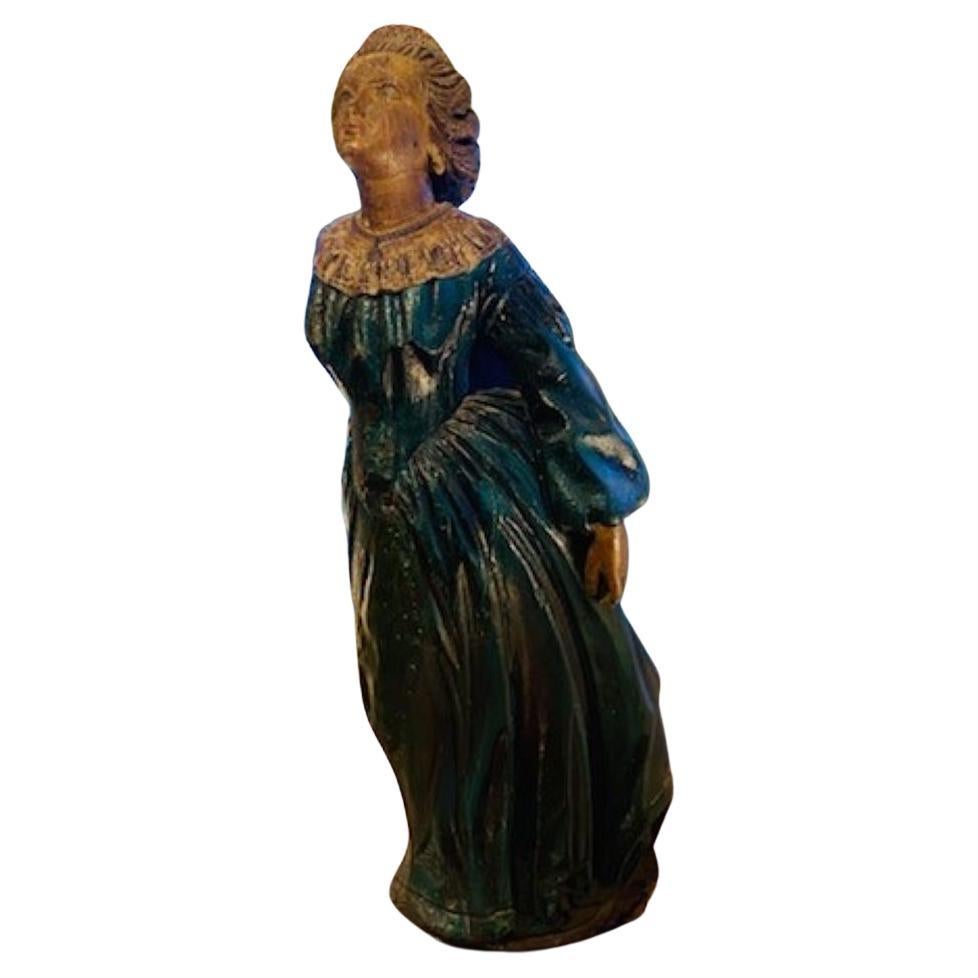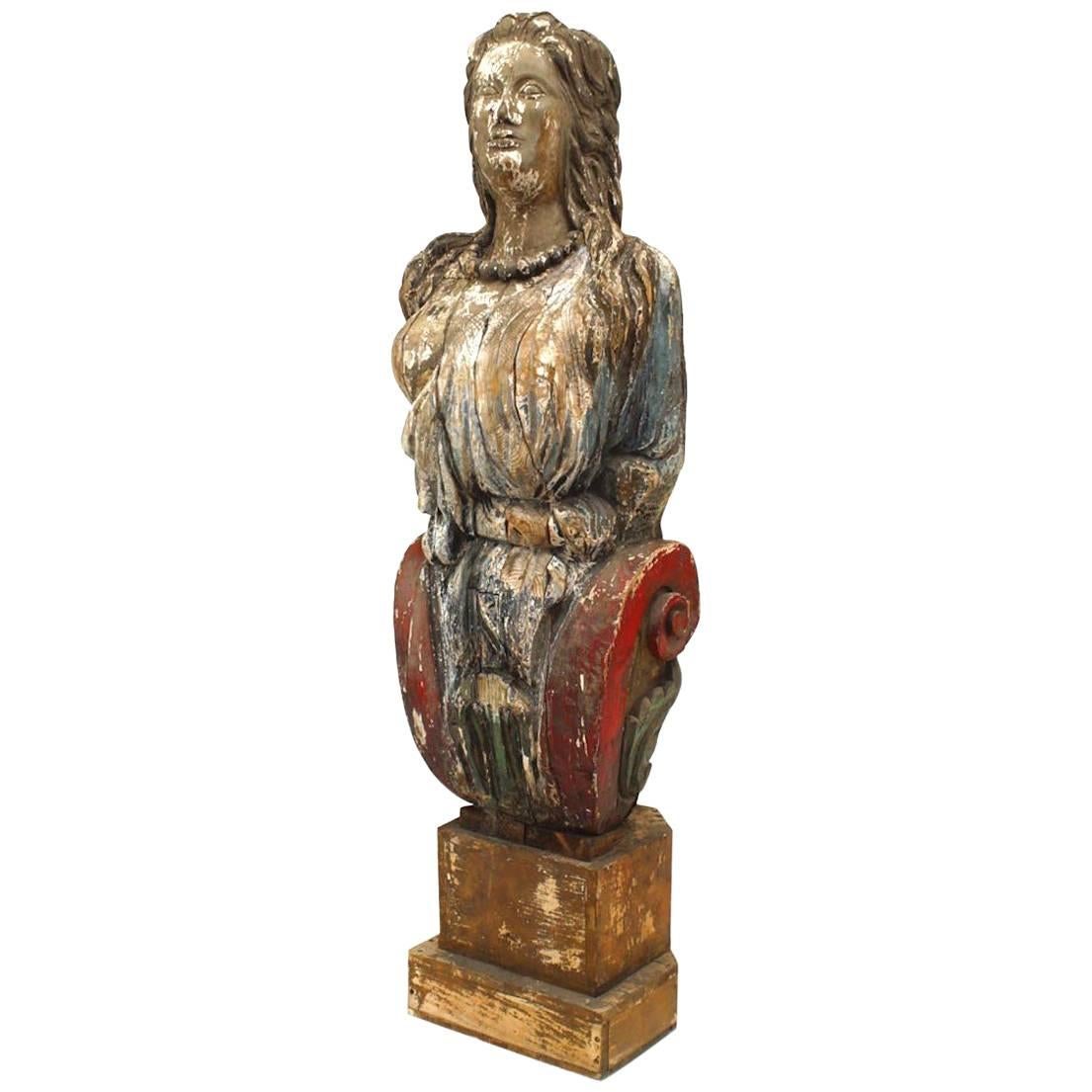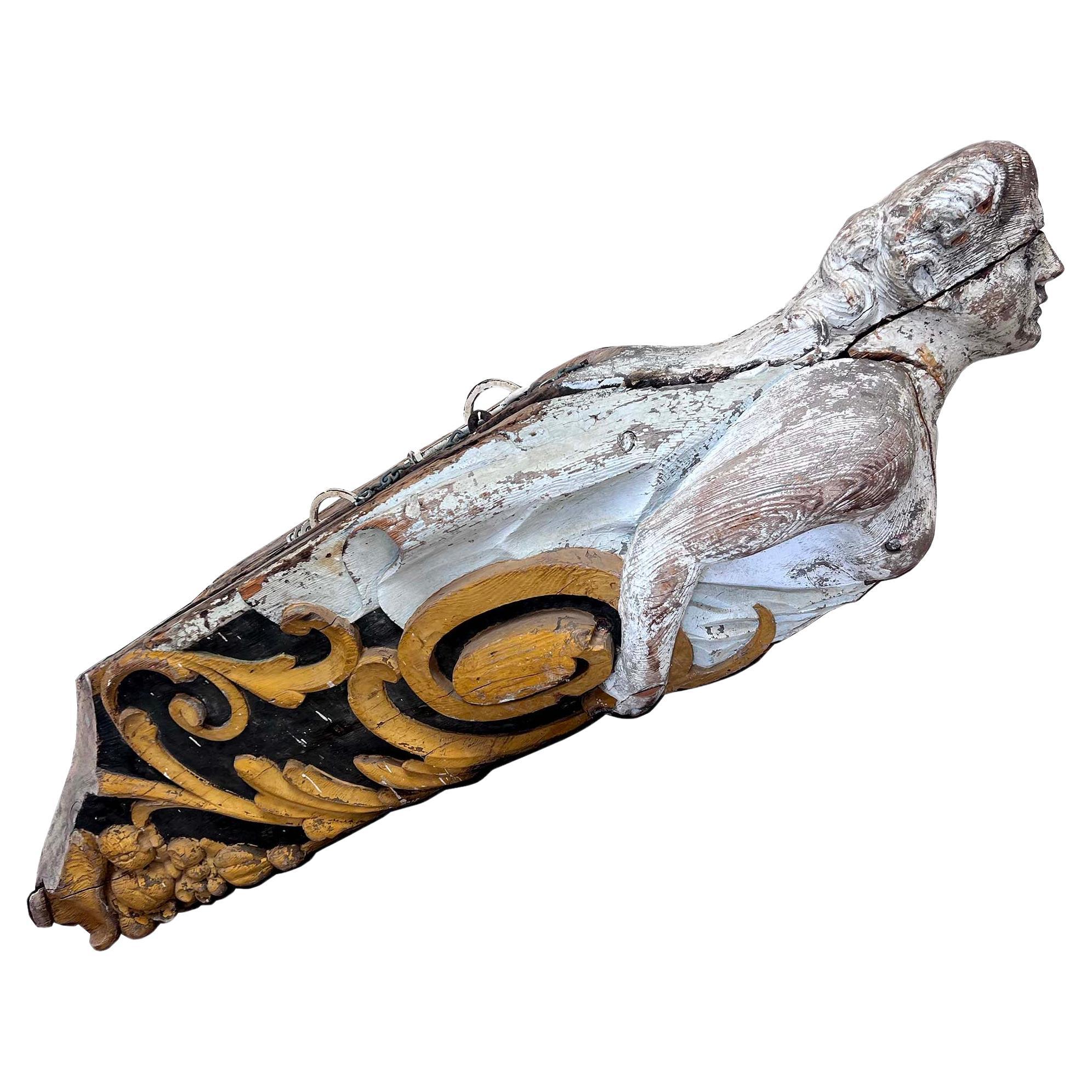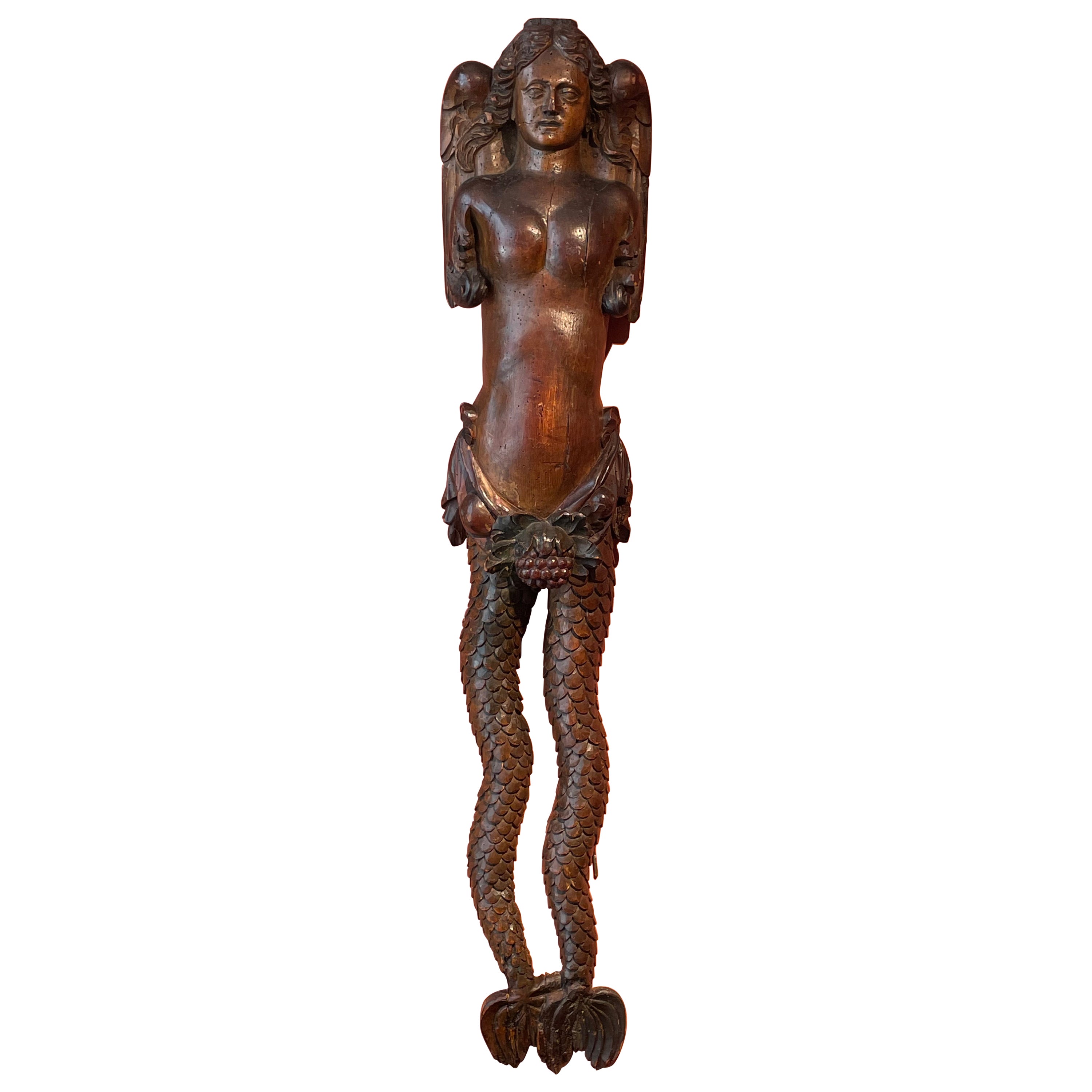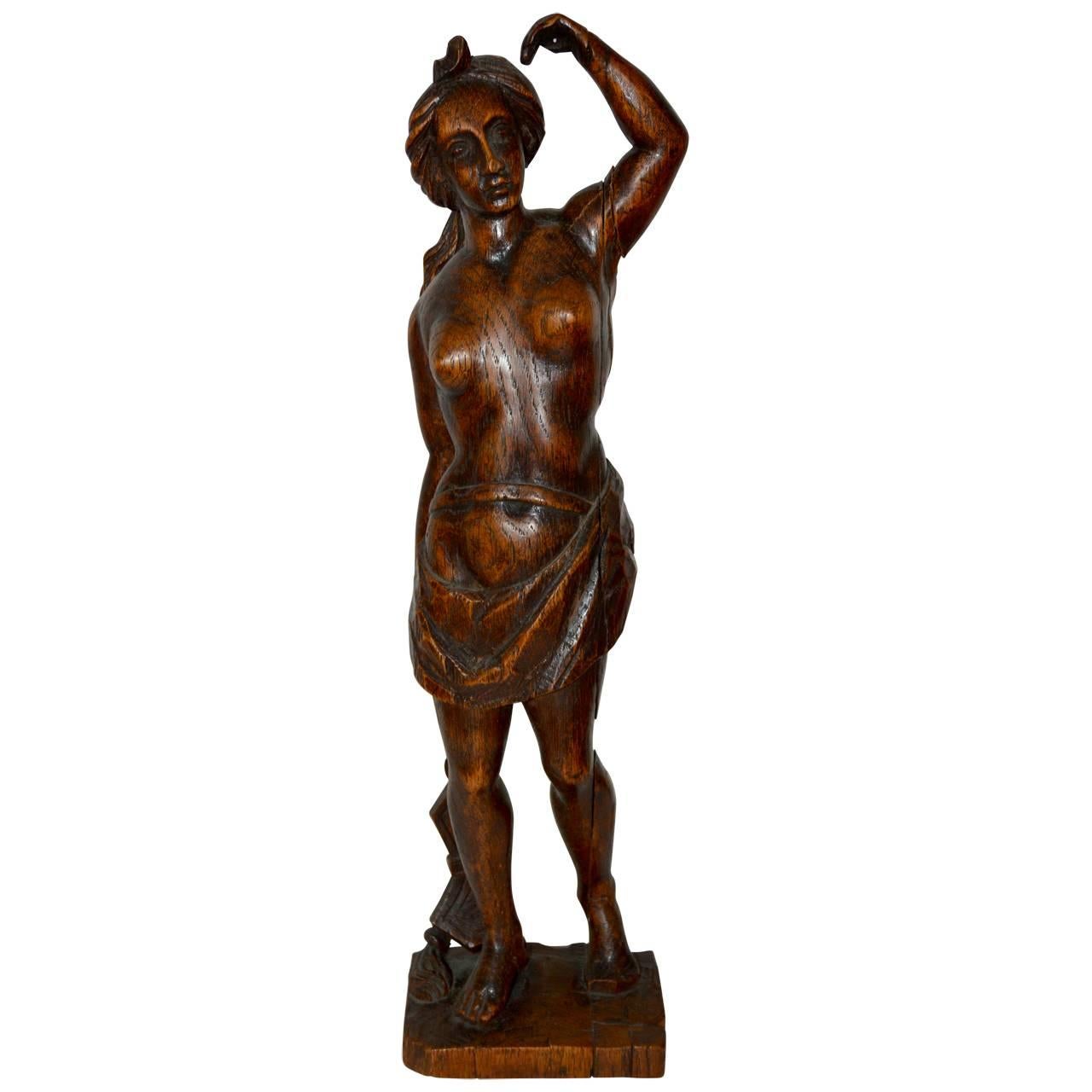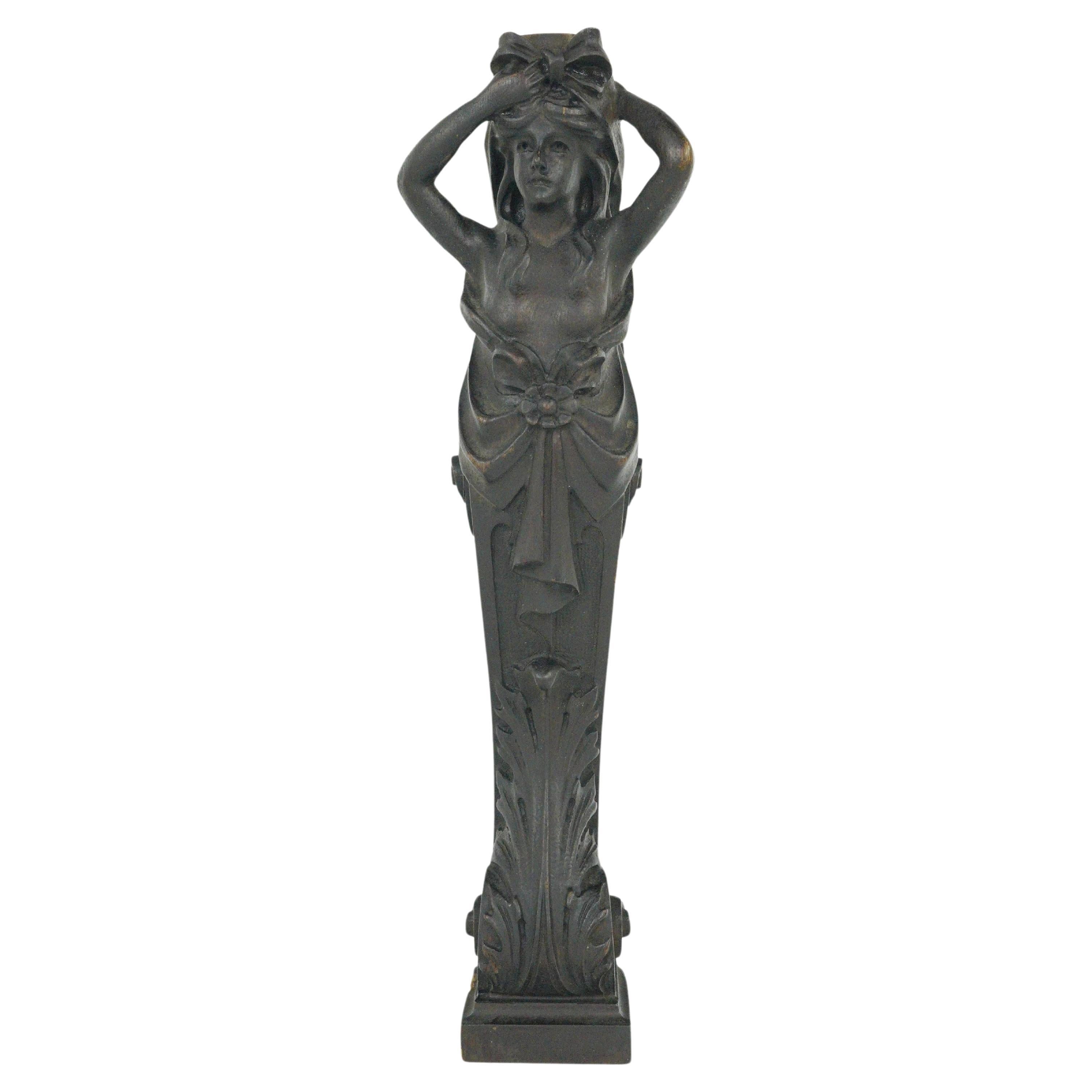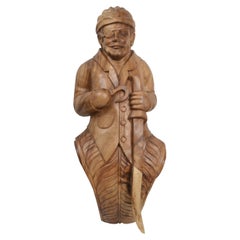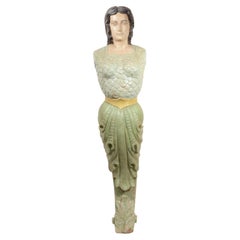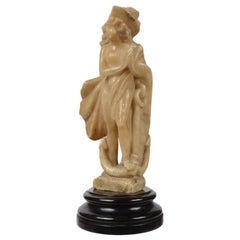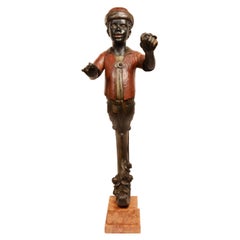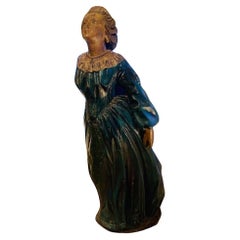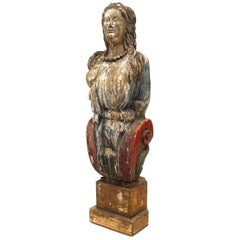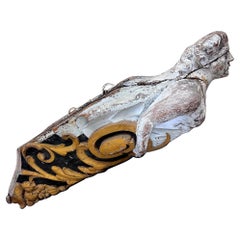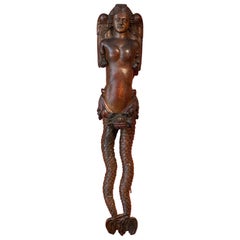Items Similar to 19th Century Carved Ship Figurehead Oak Wood Female Figure Antique Maritime
Want more images or videos?
Request additional images or videos from the seller
1 of 21
19th Century Carved Ship Figurehead Oak Wood Female Figure Antique Maritime
$42,570.85
£31,668.41
€35,500
CA$58,294.05
A$64,815.06
CHF 33,842.85
MX$788,957.08
NOK 431,819.99
SEK 404,594.69
DKK 270,241.89
Shipping
Retrieving quote...The 1stDibs Promise:
Authenticity Guarantee,
Money-Back Guarantee,
24-Hour Cancellation
About the Item
Figurehead in carved oak depicting a female figure whose body has the shape of a siren, symbol of fertility and protection, with female features in the upper part and fish tail instead of legs in the lower one.
Northern European manufacture dating back to the second half of the 19th century. It is a refined sculpture that almost certainly portrays the owner's wife or lover, who commissioned a good sculptor of the time, probably a madonnaro, to create the figurehead. The work brings out numerous details, the hair framing the finely sculpted and well-proportioned face with an ecstatic expression and is gathered within a headdress whose shape recalls the statue of liberty in New York. The generous and turgid breasts are uncovered, a bunch of grapes with leaves is carved on the pronounced belly, the grape as a symbol of freedom of the senses and earthly pleasures as well as being a symbol of fertility, wealth and Abundance which brings back the life.
It was carved in oak wood, and due to its features it certainly belongs to a merchant ship, almost certainly a medium-sized brig. Its measurements are 60 inches in height, and 12 inches in maximum width. The carving was done by hand with the use of a round carving gouge. The lack of arms is typical of the figureheads of the second half of the nineteenth century, when for practical reasons, since the arms came off with a certain frequency due to sea shocks, or were damaged by the jib sheets during tacking, it was preferred do not highlight them.
A figurehead is a wooden decoration, often a female or animal figure, which was found on the prow of ships from the 16th to the 19th century. The practice was first introduced in galleons, but even older vessels often had some decoration in the prow. Like many of the austere decorations of the time, the figurehead was intended to indicate the name of the ship that housed it to people who could not read (albeit sometimes in a convoluted way), moreover they were intended to show the owner's wealth and strength. During the Baroque period some ships boasted gigantic figureheads weighing many tons and sometimes even carrying two, one on each side of the foremast. The large figureheads, being carved in solid wood and being placed on the tip of the hull, negatively affected the ships' navigation capabilities. This, and the high construction costs, led in the 18th century to make much smaller figureheads and even to eliminate them in the following century. After the Napoleonic wars, some figureheads began to be produced again, but they only depicted small busts and not the large figures used in the past. Clippers of the 1850s and 1860s typically featured full-length figureheads, but these were relatively small and light. The figurehead as such died with the end of the use of large-scale sailing propulsion. Early steamers had structures resembling figureheads on their bows. This practice lasted until the First World War.
About the Seller
5.0
Vetted Professional Seller
Every seller passes strict standards for authenticity and reliability
Established in 1999
1stDibs seller since 2014
398 sales on 1stDibs
Typical response time: 1 hour
- ShippingRetrieving quote...Shipping from: Milan, Italy
- Return Policy
Authenticity Guarantee
In the unlikely event there’s an issue with an item’s authenticity, contact us within 1 year for a full refund. DetailsMoney-Back Guarantee
If your item is not as described, is damaged in transit, or does not arrive, contact us within 7 days for a full refund. Details24-Hour Cancellation
You have a 24-hour grace period in which to reconsider your purchase, with no questions asked.Vetted Professional Sellers
Our world-class sellers must adhere to strict standards for service and quality, maintaining the integrity of our listings.Price-Match Guarantee
If you find that a seller listed the same item for a lower price elsewhere, we’ll match it.Trusted Global Delivery
Our best-in-class carrier network provides specialized shipping options worldwide, including custom delivery.More From This Seller
View AllPolena Da Nave in Legno Di Castagno Raffigurante Capitan Uncino Italia XIX Sec
Located in Milan, IT
Polena in legno di castagno scolpito del XIX secolo, raffigurante Giacomo Uncino meglio conosciuto come Capitan Uncino, famoso pirata e il principale antagonista di Peter Pan.
Uncino è il capitano immaginario di una nave di pirati crudeli.
Viene chimato così perché al posto della mano destra ha un uncino di ferro, la mano gli fu mozzata da Peter Pan durante un combattimento e poi data in pasto ad un coccodrillo, il quale gradì così tanto la mano che spera di mangiarsi anche il pirata al quale continua a dare la caccia.
L’opera, in legno di castagno scolpito è stata realizzata da un bravo scultore ligure, Italia del Nord, alla fine del XIX secolo, di ottima fattura ritrare il mezzo busto di un uomo barbuto, l’occhio destro bendato e l’uncino al posto della mano destra, mentre la mano sinistra impugna una grande spada e una bandana come copriacapo.
Il castagno è un legno pregiato e molto resistente alle intemperie e al vento.
La spada spezzata è stata restaurata in epoca precedente, per il resto lo stato di conservazione è molto buono.
Una polena è una decorazione lignea, che si trovava sulla prua delle navi dal XVI al XIX secolo.
La pratica fu introdotta inizialmente nei galeoni, ma anche navi più antiche avevano spesso alcune decorazioni nella prua.
Come molte delle decorazioni del Tempo le polene...
Category
Antique Late 19th Century Nautical Objects
Materials
Chestnut
Polena raffigurante una figura femminile Indie Orientali fine del XIX secolo
Located in Milan, IT
Polena raffigurante una figura femminile con i capelli sciolti e una cintura che le stringe la vita; è stata scolpita in legno di tiglio, nome scientifico Tilia, un legno molto usato nei lavori di intaglio, cosa che farebbe pensare a una nave costruita in un cantiere delle Indie Orientali attorno alla fine del XIX secolo, fatto frequente in molte navi della Royal Navy, benché la presente scultura per le fattezze appartiene certamente a una nave mercantile.
Le sue dimensioni sono 163 cm di altezza – inches 64.20, 48 cm – inches 18.8 di larghezza massima misurata all’altezza delle spalle e cm 30 – inches 11.8, di profondità.
Sotto lo strato di vernice di colore verde chiaro, più recente, ci sono tracce di una colorazione bruno-marrone, probabilmente una pittura usata per la conservazione del legno. La scultura è stata eseguita a mano con uso di sgorbia. La mancanza di braccia è tipica delle polene...
Category
Antique Late 19th Century Nautical Objects
Materials
Wood
Mid-18th Century French Alabaster Sculpture Depicting a Female Nude with Anchor
Located in Milan, IT
Alabaster sculpture depicting a female nude with cloak and hat, with clasped hands and resting her foot on an anchor, as if to invoke protection for the sailors; French manufacture o...
Category
Antique 1760s French Nautical Objects
Materials
Alabaster
Small carved wooden figurehead depicting young Moretto Venice late 19th century
Located in Milan, IT
Small carved wooden figurehead depicting young Moretto, mounted on red marble base, late 19th-century Venetian manufacture.
This is a beautifully crafted sculpture made of polychrom...
Category
Antique 1890s Nautical Objects
Materials
Wood
1940s half hull of a British schooner oak wood.
Located in Milan, IT
1940s half hull of a British schooner oak wood.
Good condition. board measures 58 x 10 x 17 cm -22.8x3.95x6.7 inches.
The half-hull, used to design boats, was the tool for shipwri...
Category
Antique Early 1900s Nautical Objects
Materials
Wood
Early 20th century wooden bollard in the shape of pi used to stop a line
Located in Milan, IT
Early 20th century wooden cleat or castanet in the shape of pi used to stop a line, from a fishing boat in northern France. Generally secured by strong through-bolting screws on a...
Category
Early 20th Century Nautical Objects
Materials
Wood
You May Also Like
19th Century American Carved and Decorated Ship's Figurehead, circa 1880
Located in Nantucket, MA
19th Century American Carved and Decorated Ship's Figurehead, circa 1880, in the form of an elegant young lady, with lovely features and beautifully carved hair pulled back in a bun,...
Category
Antique 1880s American Folk Art Nautical Objects
Materials
Pine
English Country Style '19th Century' Carved and Painted Figurehead
Located in Queens, NY
English Country style (19th century) carved and painted figurehead of lady with necklace and one breast exposed.
Category
Antique 19th Century British Country Nautical Objects
Original Nautical Mast figurehead
Located in Sag Harbor, NY
This antique mast figure is French and as the story goes salvaged off a French Ship damaged in the Anglo-French War (1803–1815). The one side shows fire damage and is burned in charc...
Category
Antique Mid-19th Century French Early Victorian Nautical Objects
Materials
Iron
16th Century Southern Germany Carved Wood Bracket Depicting a Mermaid
Located in Saint-Ouen, FR
In Medieval Europe and even more during the early 16th century fantastic beasts could be found in Bestiaries, a literary genre close to poetry. A bestiary used the characteristics of...
Category
Antique 16th Century German Renaissance Animal Sculptures
Materials
Wood
19th Century Wooden Lady Sculpture
Located in Copenhagen, K
Beautiful carved wood sculpture of a lady.
Category
Antique Mid-19th Century French Belle Époque Figurative Sculptures
Materials
Wood
$960 Sale Price
20% Off
19 in. Solid Chestnut Woman Goddess Furniture Carving
Located in New York, NY
Solid chestnut carving of a woman adorned with ribbon and foliate detail. It mounts to the back, top, and bottom. Good condition with appropriate wear from age, with minor scuffs and...
Category
Early 20th Century American Architectural Elements
Materials
Chestnut
More Ways To Browse
19th Century Ship
Found Wood Object Art
Carved Ship
Ship Old Wood
Antique Wooden Ships
Merchant Ship
Nautical Antiques
Nautical Antiques Furniture
Ship Wood Carving
Antique Wood Fish
Carved Wood Bow
Folk Art Fish
Hand Carved Wooden Ships
Gouged Wood
Large Wood Fish
Sailing Ship 19th Century
Carved Wood With Grapes
Antique Carved Fish
